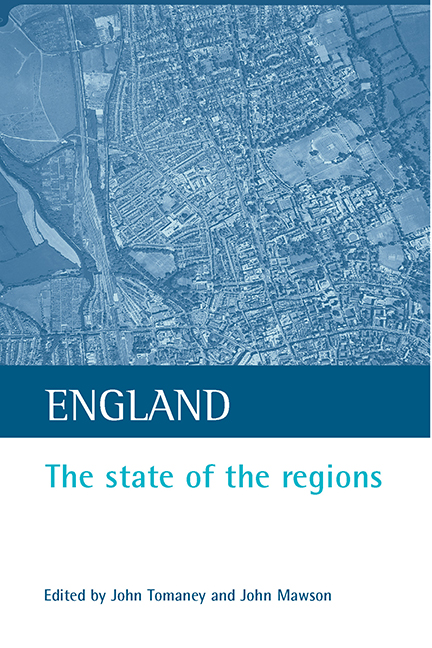Book contents
- Frontmatter
- Contents
- List of tables and figures
- Acknowledgements
- List of contributors
- one Introduction
- two Regional government in England: reviewing the evidence base
- three New Labour and the evolution of regionalism in England
- four Yorkshire (and the Humber)
- five Institutional collaboration in the West Midlands region
- six England's North West
- seven The South West
- eight Regionalism in the East of England
- nine The South East region?
- ten Regionalism in North East England
- eleven Regional strategy development in the East Midlands
- twelve The problem of regional governance
- thirteen Elected regional government: the issues
- fourteen Barnett plus needs: the regional spending challenge in Britain
- fifteen Conclusion: prospects for regionalism
- Index
- Also available from The Policy Press
fourteen - Barnett plus needs: the regional spending challenge in Britain
Published online by Cambridge University Press: 20 January 2022
- Frontmatter
- Contents
- List of tables and figures
- Acknowledgements
- List of contributors
- one Introduction
- two Regional government in England: reviewing the evidence base
- three New Labour and the evolution of regionalism in England
- four Yorkshire (and the Humber)
- five Institutional collaboration in the West Midlands region
- six England's North West
- seven The South West
- eight Regionalism in the East of England
- nine The South East region?
- ten Regionalism in North East England
- eleven Regional strategy development in the East Midlands
- twelve The problem of regional governance
- thirteen Elected regional government: the issues
- fourteen Barnett plus needs: the regional spending challenge in Britain
- fifteen Conclusion: prospects for regionalism
- Index
- Also available from The Policy Press
Summary
Introduction
British political debate about public spending has concentrated on two main issues: whether there is too much – or too little – public spending; and the distribution of spending between functions, such as defence, education, and health. Questions concerning the efficiency or the effectiveness of public spending have tended to be variations on these issues. Now a third and rather different issue is looming large: the geographical distribution of spending between the regions and the nations of Britain.
Devolution has pushed this issue up the political agenda. The creation of the Scottish Parliament, the Welsh Assembly, and, to a lesser extent, the Northern Ireland Assembly, plus the pressure for regional government in England, has exposed three facts that pre-devolution British constitutional arrangements had brushed under the carpet:
1. There is a fiscal mechanism for distributing public spending to the nations of Scotland, Wales and Northern Ireland;
2. There is no equivalent mechanism for distributing spending to the regions of England;
3. When existing spending levels in the three devolved nations are compared to existing spending in the English regions, it appears that some regions get a raw deal, and that the devolved nations get a good deal.
Increasing awareness of these facts has provoked considerable debate. Mainly, this has focussed on the national fiscal distribution mechanism, known as the Barnett Formula. In North East England, a vocal lobby led by The Journal, Newcastle upon Tyne's daily newspaper, wants spending in the region raised to Scottish levels (see Chapter Ten of this volume). This has a varying amount of support from all political parties and other groups, such as trade unions. Business organisations are increasingly aware of the issue. West Midlands First, an umbrella group of business organisations representing the region, has told ministers that they “believe it is unfair that Scotland Wales and Northern Ireland receive a higher per capita spend” and that “English regions are disadvantaged by the Barnett spending formula” (Guthrie, 2000). Even in Wales, which, from an English viewpoint, is thought to get a relatively good deal, there is a demand for a review of the Barnett Formula.
- Type
- Chapter
- Information
- EnglandThe State of the Regions, pp. 187 - 206Publisher: Bristol University PressPrint publication year: 2002



